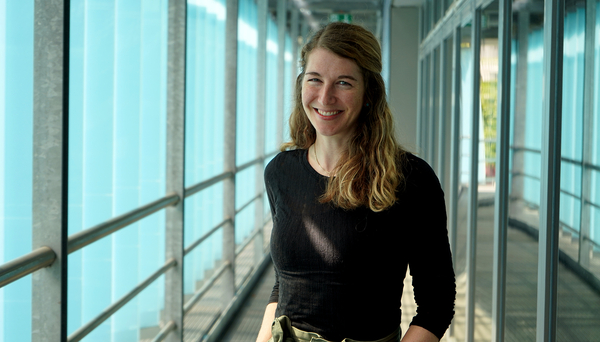News Detail
Serina Robinson receives ERC Starting Grant
September 5, 2025 |
Serina Robinson, currently group leader in the Department of Environmental Microbiology at the aquatic research institute Eawag and lecturer at ETH Zurich, is investigating how microbes break down chemical pollutants in the environment and how the activity of microbial enzymes can be predicted. She has now been selected for the ERC Starting Grant for this research. This means that she will have 1.5 million at her disposal for the next five years.
ERC Starting Grants are awarded to outstanding researchers of all nationalities who are starting an independent career and intend to set up their own research team or programme in Europe. ‘This grant is a dream come true for me. And I would like to express my gratitude and appreciation to the mentors, colleagues, friends and family members who have invested so much time to make this possible,’ Robinson says.
PFAS as a research focus
In her ERC project, which she will carry out at Eawag and ETH Zurich, she plans to use laboratory experiments and modelling to investigate how microbial enzymes bind to per- and polyfluoroalkyl substances (PFAS). Such binding is central to new approaches for detecting and partially transforming these persistent pollutants, also known as ‘forever chemicals’. Awareness of the harmful effects of certain PFAS is growing worldwide, and with it the need to monitor them. To this end, Robinson intends to develop practical analytical tools and biotechnological methods to monitor these substances, which are partially toxic to humans and the environment.
‘I am motivated by research into PFAS because these are pollutants that affect us all on a daily basis,’ says Robinson, explaining her choice of research focus. She also completed her PhD in Minnesota, one of the states where PFOA was first mass-produced. PFOA is known to be harmful to the liver, toxic to reproduction and carcinogenic. ‘This topic has therefore always been close to home for me,’ says Robinson. However, measures are just as relevant in Switzerland as they are worldwide.
Interface between different research areas
Robinson is particularly fascinated by learning more about the various areas in which PFAS play a role and how PFAS research areas in chemistry, microbiology and biotechnology overlap: ‘Thanks to the efforts of Christa McArdell, Manfred Heuberger, and many others, I have met colleagues from a broad Empa and Eawag community – from materials researchers developing PFAS substitutes, to toxicologists and atmospheric chemists.’
Robinson receiving this grant would not have been possible a few years ago. In 2021, Switzerland was excluded from important areas of the EU's Horizon programme, including ERC grants. A transitional arrangement in March 2024 allowed Swiss researchers to participate in the ERC call for Advanced Grants 2024. In July 2024, the EU also decided to allow researchers in Switzerland to participate in three calls for proposals in the 2025 programme year and invited them to participate in the ERC Starting Grant 2025, Synergy Grant 2025 and Consolidator Grant 2025 calls.
Cover picture: Serina Robinson receives the ERC Starting Grant (Photo: Eawag, Leonardo Biasio).

